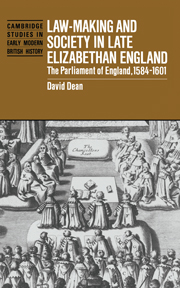Book contents
- Frontmatter
- Contents
- Acknowledgements
- Note to the reader
- List of abbreviations
- Introduction
- 1 Initiation and procedure
- 2 Supply and the general pardon
- 3 The crown and the state
- 4 Religion and the church
- 5 The commonweal
- 6 Law reform
- 7 Private legislation
- 8 Expiring laws continuance acts
- Epilogue: the Parliament of 1604
- Conclusion
- Index of acts
- Index of bills
- General index
Conclusion
Published online by Cambridge University Press: 14 September 2009
- Frontmatter
- Contents
- Acknowledgements
- Note to the reader
- List of abbreviations
- Introduction
- 1 Initiation and procedure
- 2 Supply and the general pardon
- 3 The crown and the state
- 4 Religion and the church
- 5 The commonweal
- 6 Law reform
- 7 Private legislation
- 8 Expiring laws continuance acts
- Epilogue: the Parliament of 1604
- Conclusion
- Index of acts
- Index of bills
- General index
Summary
On six occasions during the last nineteen years of Elizabeth's reign several hundred members of the governing class met for a total of over fifty-six weeks at Westminster. A few had taken great pains to obtain the right to attend, and many travelled considerable distances to be there. They came to play a significant constitutional role. As knights, burgesses and citizens, as peers, bishops and judges, they assumed a duty to give counsel to their sovereign in parliament. Advising the government and discussing problems with each other, their actions would lead to the making of laws which would affect almost every aspect of the life of the nation. For some this was a God-given duty, for others one which rested more on their experiences as magistrates; they came determined to serve their localities and communities well. All were aware that others had undertaken such a role before them, and many were conscious of parliament's important place in establishing the laws and customs within which they lived their lives.
It might seem odd to think that not so very long ago historians were convinced that a sizeable minority of these men came hoping to wreck the established church, to overthrow the ecclesiastical hierarchy and replace it with a new church based on a reformed prayer book. To these religious grievances were grafted economic ones involving abuses of the royal prerogative, such as excessive purveyance or the issuing of patents of monopoly to courtiers.
- Type
- Chapter
- Information
- Law-Making and Society in Late Elizabethan EnglandThe Parliament of England, 1584–1601, pp. 282 - 290Publisher: Cambridge University PressPrint publication year: 1996

